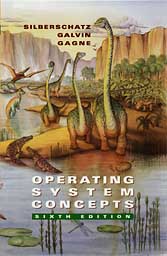





Welcome to CS 3013. For this course, we will centralize the distribution of information on this course web page. This page can be found on the WPI web server at http://web.cs.wpi.edu/~cs3013/c07/
| Professor: | Dr. Jerry Breecher, Mail to: jb at cs.wpi.edu |
| Meeting Time: | Lecture: Monday, Tuesday, Thursday, Friday 10:00 - 10:50 a.m. SL 115 |
| Office Hours: | Before and after class - e-mail works great |
| TA's | Choong-Soo Lee clee01@cs.wpi.edu |
| Rui Lu kkboy@cs.wpi.edu | |
| Keith Craig kcraig08@WPI.EDU | |
| CS3013-staff mailing list to Professor and Teaching Assistants |

This is what the catalog says:
This course provides the student with an understanding of the basic components of a general-purpose operating system. Topics include processes, process management, synchronization, input/ output devices and their programming, interrupts, memory management, resource allocation, and an introduction to file systems. Students will be expected to design and implement a large piece of system software. Intended audience: computer science majors and others interested in studying the software and hardware components of computer systems. Undergraduate credit may not be earned both for this course and for CS 502. Recommended background: CS 2303 or CS 2301, and CS 2011.Operating System Concepts, Seventh Edition, Abraham Silberschatz, Peter Baer Galvin, Greg Gagne. John Wiley & Sons, Inc.
The hardcover edition is ISBN: 0-471-69466-5 The paperbacked edition is ISBN 0471-973777. I've asked the bookstore to get the paperback since it's much less expensive. Also, the text doesn't change that much from edition to edition; you can probably get away with a 6th edition just fine.
Your evaluation in this course is determined by:
40% Projects, homework, class involvement
30% Midterm Exam
30% Final Exam
Project Weights:
Project 1 - 15 pts
Project 2 - 10 pts
Project 3 - 20 pts
Project 4 - 30 pts
Project 5 - 25 pts
In the Table below are pointers to the notes for the course. The formats available can be read by Microsoft PowerPoint (.ppt), or read by Apache (.pdf). Lectures generally will be from these notes. Feel free to print them out and use them during class to avoid extensive notetaking. You can simply annotate these notes rather than writing everything. But warning, don't be lulled into a false sense of security. What's talked about in the class will be in MUCH MORE DETAIL than is present on these slides.
An added advantage of written out notes is that you know what to read in the text. In general, I follow the book fairly closely so you should have no trouble figuring out where to find material to amplify these course notes.
The following Notes are arranged in book order, not necessarily in the order we'll lecture on them.
| Lecture Title | PowerPoint | Adobe Acrobat |
| Overview | Overview.ppt | Overview.pdf |
| Components | Structures.ppt | Structures.pdf |
| Processes | Processes.ppt | Processes.pdf |
| Threads | Threads.ppt | Threads.pdf |
| Scheduling | Scheduling.ppt | Scheduling.pdf |
| The Big Picture | SystemOverview.ppt | SystemOverview.pdf |
| Synchronization I | Synchronization.ppt | Synchronization.pdf |
| Deadlocks | Deadlocks.ppt | Deadlocks.pdf |
| Memory Management | Mem_Mgmt.ppt | Mem_Mgmt.pdf |
| Virtual Memory | Virtual_Memory.ppt | Virtual_Memory.pdf |
| Intel's Use of Virtual Memory | Intel Virtual Memory.ppt | Intel Virtual Memory.pdf |
| File Systems | File_Systems.ppt | File_Systems.pdf |
| File Structures | IO_Systems.ppt | IO_Systems.pdf |
PROJECTS: These are programming assignments that you are expected to turn in. There's a schedule for these that's given later in this syllabus.
Here's how the material and deliverables break down for the semester.
|
Date |
Topic |
|
Thurs - Jan 11 |
Course Introduction. PROJECT 1 ASSIGNED |
|
Fri - Jan 12 |
Overview & Structure of Operating Systems |
|
Mon - Jan 15 |
Structures |
|
Tues - Jan 16 |
Processes |
|
Thurs -Jan 18 |
Processes |
|
Fri - Jan 19 |
Threads PROJECT 1 DUE, PROJECT 2 ASSIGNED |
|
Mon - Jan 22 |
Scheduling |
|
Tues - Jan 23 |
Scheduling |
|
Thurs -Jan 25 |
Synchronization PROJECT 3 ASSIGNED |
|
Fri - Jan 26 |
Synchronization PROJECT 2 DUE, |
|
Mon - Jan 29 |
Synchronization |
|
Tues - Jan 30 |
Deadlocks |
|
Thurs -Feb 1 |
Deadlocks |
|
Fri - Feb 2 |
Deadlocks |
|
Mon - Feb 5 |
MIDTERM EXAM |
|
Tues - Feb 6 |
Memory Management PROJECT 4 ASSIGNED |
|
Thurs - Feb 8 |
Memory Management PROJECT 3 DUE, |
|
Fri - Feb 9 |
Memory Management |
|
Mon - Feb 12 |
Memory Management |
|
Tues - Feb 13 |
Memory Management |
|
Thurs - Feb 15 |
NO CLASS |
|
Fri - Feb 16 |
Virtual Memory |
|
Mon - Feb 19 |
Virtual Memory PROJECT 5 ASSIGNED |
|
Tues - Feb 20 |
Virtual Memory PROJECT 4 DUE MONDAY AT MIDNIGHT |
|
Thurs - Feb 22 |
Virtual Memory |
|
Fri - Feb 23 |
File Systems |
|
Mon - Feb 26 |
IO Systems |
|
Tues - Feb 27 |
IO
Systems
PROJECT 5 DUE MONDAY AT MIDNIGHT |
|
Thurs - Mar 1 |
FINAL EXAM |
A significant component of the CS 3013 course is the set of projects, in which you will gain practice in diving into the guts of LINUX as well as using system programming to better understand the services that can be provided by the OS.
The calendar indicating kickoff and due dates for these projects is given above.
Project 1 - LINUX Process Management
Project 2 - Fossil Lab Machine Setup